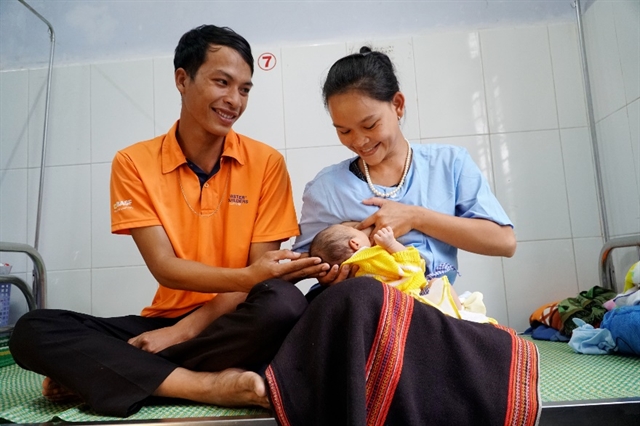 Society
Society

The Quảng Nam Province’s Đông Giang District Medical Centre was recognised as a Center of Excellence for Breastfeeding in Việt Nam, providing essential newborn care services to rural and ethnic minority families in the South Central Coast region.

|
| A Cơ Tu ethnic minority mother and her husband at Đông Giang District Medical Centre. — Photo Alive & Thrive |
HÀ NỘI — Quảng Nam Province’s Đông Giang District Medical Centre was recognised as a Center of Excellence for Breastfeeding in Việt Nam, providing essential newborn care services to rural and ethnic minority families in the south central coastal region.
“Medical staff used the indigenous Cơ Tu language when providing counselling during prenatal checks, at delivery, and after birth, in order to achieve a 92 per cent exclusive breastfeeding rate during hospital stays in the third quarter of 2019,” said Dr. Nguyễn Thị Quyết, Director of Đông Giang District Medical Centre.
“In the past, I preferred my wife to give birth at home so the grandparents and siblings could be around,” said Phương Briu from the Cơ Tu ethnic minority group in Việt Nam as he accompanied his wife in the friendly delivery room at Đông Giang Medical Centre.
“But now, even though she gives birth in the hospital, I still have the chance to be with her and witness the blessed moment when my child cries for the first time, and I know she is healthy and safe with the support of the doctors,” said Phương.
“Despite having limited resources and infrastructure as a remote medical facility, Đông Giang District Hospital successfully enacted the Ministry of Health and World Health Organization’s recommended six-step procedures for essential newborn care right after birth. These steps include thoroughly drying the newborn, keeping the newborn warm through 90 minutes of skin-to-skin contact, delaying cord clamping and early initiation of breastfeeding,” said Roger Mathisen, Alive & Thrive’s Southeast Asia Regional Director, during the designation ceremony.
On January 17, the Cẩm Lệ Medical Centre in Đà Nẵng City will also receive the precious award, bringing the country’s total to seven since August 2019.
Over 90 per cent of newborns are breastfed within the first 90 minutes while skin-to-skin contact for both vaginal and caesarean births at Cẩm Lệ Medical Centre. This impressive performance was also reported through phone surveys with new mothers after discharge at Cẩm Lệ Medical Centre in the same central coastal region.
“If all district hospitals and medical facilities offered early essential newborn care the way Cẩm Lệ Medical Centre does, it would reduce the overloading at upper-level hospitals,” said Ngô Thị Kim Yến, General Director of the Đà Nẵng Health Department.
To enable recommended breastfeeding practices, both district hospitals identified and found solutions to overcome some harmful beliefs and customs. In Cẩm Lệ, drops of the first milk rich in nutrients and antibodies were not given to newborns, while in Đông Giang, the Cơ Tu ethnic minority often give babies rice water instead of breast milk or feed their babies rice too early. Mothers also need to return to farm work early, limiting their ability to be with their infants and exclusively breastfeed for the first six months.
Early essential newborn care refers to a set of interventions during the first hours and days of a newborn’s life that are critical to child survival and development. Disparities exist in Việt Nam in terms of access to quality medical services among different income, social status and ethnic groups, especially in maternal and childcare. Both Cẩm Lệ and Đông Giang medical centres will create opportunities for mothers and children in district, rural and mountainous area to access maternal and newborn care services.
The Center of Excellence for Breastfeeding Initiative has been developed and implemented by Việt Nam’s Ministry of Health, provincial Departments of Health with support from Alive & Thrive and Irish Aid, encouraging health facilities to create and maintain breastfeeding-friendly environments by practicing early essential newborn care and supporting breastfeeding. — VNS